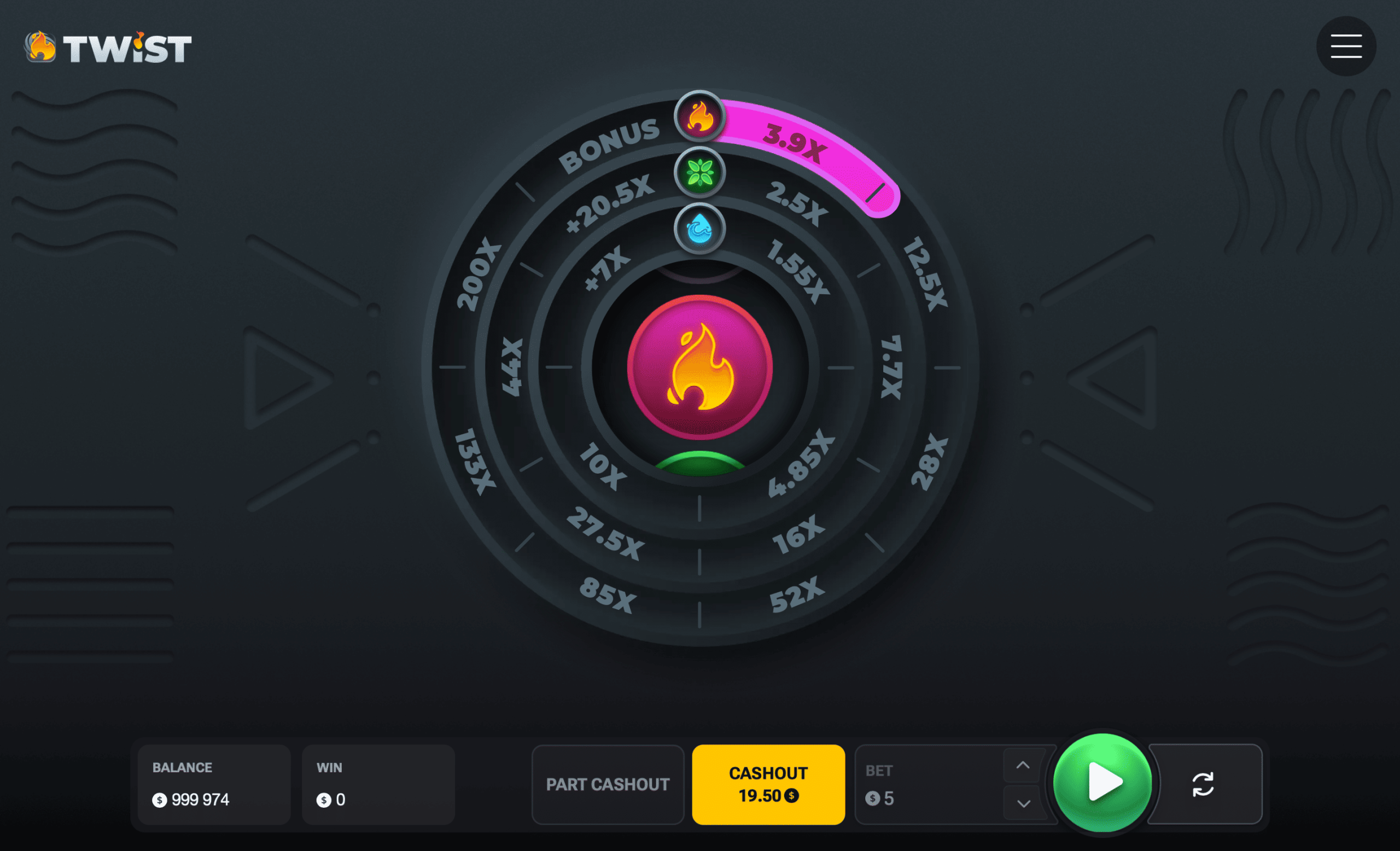Twist Crash Game by InOut
Twist is presented by InOut as a single-player slot that replaces a timer-based bust curve with three concentric rings themed around water, earth, and fire; each ring fills through spins, while a clearly signposted “symbol of death” represents the primary loss boundary. The official game page lists core facts—single-player classification, RTP of 97%, and a release day set to August 8, 2025 – alongside a prominent Demo Play entry point, establishing the factual baseline for analysis and testing.
The term “Twist crash game” often appears in search queries due to its similarity to the tension profile associated with traditional crash games, characterised by a gradual increase in stakes against a clear risk indicator. However, the underlying mechanics of the game are more akin to a traditional slot machine, rather than a continuous multiplier system that can burst at any given moment. This distinction is crucial when considering factors such as volatility, bankroll depletion, and optimal play strategies, as the outcome depends on the distribution of symbols and threshold values within the rings, rather than being predetermined by a time-based hazard rate.
Within this framework, the interface conveys state with remarkable clarity. The three concentric rings serve as progress indicators and pacing mechanisms, guiding attention in Twist towards micro-goals and mitigating the cognitive burden associated with intricate bonus structures. The visual language – composed of elements, patterns, and a symbol representing death – imbues the interface with narrative depth without compromising the underlying randomness of the system.
Best online casinos to play Twist game
Operator menus differ by jurisdiction and integration partner, so no specific availability is asserted here; instead, the examples below represent well-known brands where slots often sit alongside arcade titles and online casino crash games. Catalogue checks in the local lobby remain decisive, especially when a site supports both fiat rails and crypto casino games. When a lobby labels the title or category as a Twist crash game, taxonomy should not be confused with mechanics; the published page defines the loop.
Fresh Casino
Fresh Casino is frequently featured for its up-to-date, instant content and seasonally-themed promotions. If such an ecosystem is present, it serves as a natural platform for a ring meter slot. However, it is crucial to verify the presence of the title in a particular region before planning a session and allocating a budget.
Irwin Casino
Irwin Casino is listed as an affiliate with a diverse selection of slots, and the integration of new vendors varies depending on the market. To verify that the implementation of the local licence is active, Twist title checks should employ provider filters or conduct an on-site search.
1xBet
The extensive presence of 1xBet, coupled with its parallel arcade segments, renders it a viable destination once supply agreements are established. However, given the diversity of jurisdictions, obtaining lobby confirmation remains an essential step in the planning process.
BC.Game
BC.Game is a prominent player in the realm of cryptocurrency-driven gaming, offering a unique combination of slot and crash games under one umbrella. The platform's emphasis on swift settlements and flexible denominations appeals to a diverse audience, including those familiar with Twist crash game categories and related random number generator (RNG) content.
Stake
Stake is a well-established crypto-native operator that offers a wide range of gaming options. For any casino game listed on the platform, the local catalogue determines access, and promotional terms must be carefully reviewed to ensure compatibility with the ring meter pacing.
Technical specifications and platform compatibility
InOut positions its catalogue as HTML5-native, crypto-ready, and optimised for Android, iOS, and desktop browsers, with fast integration and demo access highlighted across corporate pages. Those platform claims are relevant because they frame expectations around device coverage, loading behaviour, and the ease of previewing the game online in a sandbox before any real money crash game session.
Device and browser support
Platform language from InOut cites consistent play across Android, iOS, and desktop form factors, which maps to modern Chromium, WebKit, and Gecko engines. In practical terms, this implies uniform behaviour for touch inputs, fullscreen transitions, and standard audio toggles, with no plugin requirements. Those are the preconditions that typically define mobile-compatible crash games and adjacent instant content in mixed lobbies.
Performance and user experience
The UI in the Twist game is purposefully clean: meters are prominent, stake controls are stable, and transitions are short, which preserves ring salience at higher spin rates. While performance varies by operator wrapper, provider-level demos load briskly and keep the interaction model uncluttered – an enabling factor for disciplined testing before live sessions.
| Attribute | Value / Notes |
| Players | Single-player (no lobby) |
| RTP | 97% (provider page) |
| Release day | August 8, 2025 |
| Engine | HTML5; browser-native rendering |
| Input | Touch and mouse; responsive layout |
| Free version | Provider-hosted Demo Play entry point |
Twist game concept and theme
The game employs a triad of elemental forces – water, earth and fire – to define its rings, creating a clear progression loop that can be easily followed. Partial fills signal momentum, while full rings represent a state of reward. The symbol of death marks a point of risk.
Because the states are clearly defined, analysts can easily observe the cadence and create session notes in Twist without the need for reverse engineering a hidden ladder. The text on the page explicitly positions the experience as a single-player one, setting expectations for pacing and lack of pressure in the lobby.
From a taxonomic perspective, some operators may group this game with online casino crash games due to similar adrenaline-fueled elements. However, the lack of a multiplier that increases over time and the use of spins to progress distinguish it from the arcade crash loop model.
Rather than viewing the rings as a path to «ride», treat them as staged opportunities.
Key game mechanics and features
The rings turn each session into a sequence of overlapping mini-goals. As spins advance the meters, Twist players observe near-fills that feel “crash-like”, even though the engine is a slot RNG. The death symbol acts as a discrete wipe or setback event, analogous conceptually to a bust.
Key mechanics at a glance include the following items, which are relevant for bankroll logs and post-session reviews:
- Three elemental rings that accumulate through spins and can unlock growing rewards on completion.
- A death symbol that terminates momentum, defining the primary risk boundary in the cycle.
- A single-player loop that eliminates external timing pressure or public cash-out rails.
- A lean UI that emphasises ring state and stake controls over complex feature trees.
Because the loop is compact and readable, logbooks can focus on ring cadence and wipe frequency rather than juggling multiple side features.
How to play Twist crash game?
The Twist game session flow is traditional: set a stake, initiate a spin, track ring progression, and manage exposure relative to wipe risk. The experience resembles bonus-hunt discipline more than a race to cash out – the crucial moments are ring completions and their spacing, not milliseconds on a multiplier line. The game can be launched in demo from the provider’s page, enabling dry-runs before moving to any operator lobby.
For structured practice and clean notes, the following procedural list keeps actions observable and repeatable:
- Choose a base unit that fits the bankroll model (for illustration, $10).
- Spin in fixed cycles (for example, 200-500 spins) while logging ring partials and fulls.
- After any wipe event, reset to the base unit and mark a new cycle line in the log.
- Scale up one step only after a sequence of favourable states, then revert if momentum fades.
Planned cycles and reset the curb tilt, and make the cadence of rings easier to evaluate without importing habits from a pure Twist game crash lobby.
Betting system and crash mechanics
The process of determining the size of a stake here involves more than just a simple calculation; it is a matter of controlling denominations. Therefore, discussions about the risk associated with the crash game should focus on analysing symbol frequencies and the occurrence of full rings, as these factors significantly influence both streaks and dry spells.
Treat full rings as catalysts for payouts, and wipes as obligatory signals for resetting in the staking system. It is important to note that compounding without any evidence of momentum can lead to an increase in the probability of losing in the ring-meter segments.
Dual bet and risk management features (if applicable)
The public materials for the Twist game do not mention dual-bet ladders, automatic cashouts, or multi-stakes automation. The focus of InOut’s description lies on rings, elements, and a solo loop; therefore, risk management in crash games should be implemented through an external bankroll strategy, including fixed-fraction betting, stop-loss mechanisms, and profit locks based on cycle reviews.
While some games in the provider’s ecosystem offer automation features, the game description does not mention them in this particular release.
Multiplayer and social interaction aspects
The specification reads “Players: Single-player,” which means no shared table, chat, or public board – no multiplayer pressure and no copycat effects from other bettors. Pace and focus are entirely local in the Twist game, making the ring cadence the correct anchor for attention.
Winning potential and RTP insights
A posted 97% RTP places the title above the market’s common 95–96% band; in expectation, the long-run return of a fixed strategy improves by one to two percentage points compared with many general-market slots, holding variance constant. Volatility isn’t explicitly rated on the page, so inference should rely on observed spacing between ring completions and the frequency of wipe symbols in Twist game online demo sessions rather than on assumptions.
Illustrative bankroll governance (not a paytable, purely arithmetic):
|
Element |
Example Rule |
Illustration in $ |
|
Base unit |
Fixed per cycle |
$10 per spin |
|
Escalation |
+1 step after two favourable sequences |
Step to $12 for the next 50 spins |
|
Reset |
Any wipe event or drawdown > 30% |
Return to $10 immediately |
|
Profit lock |
Bank 20% of net positive per cycle |
If +$50, lock $10, continue |
These scaffolds are compatible with ring-meter pacing and reduce overexposure during clustered wipe events. They are agnostic to operator bonuses and should be recalibrated if promotion terms alter EV.
Explanation of RTP
RTP (return to player) is a theoretical average over a very large number of spins. The 97% value is published on the official Twist game online page and indicates that, absent fees and online casino bonuses, $100 wagered across the long run returns $97 on average, with short-term results dominated by variance. The concept is descriptive, not predictive of any single cycle.
Winning strategies and payout structure
Because only thematic and high-level facts are public, the strategy must emphasise discipline rather than pattern hunting. The following list concentrates on actions that interact cleanly with ring pacing:
- Fix a base unit and define cycle lengths in advance; log ring partials and fulls for later review.
- Avoid progressive martingale responses to wipes; ring-meter structures punish uncontrolled compounding.
- Treat Twist crash game promotions as exogenous variables; verify weighting before mixing them with the session plan.
- Calibrate attention to wipe frequency, not hunches about “due” rings; recency bias inflates risk.
InOut’s broader crash catalogue is frequently described by third-party overviews as supporting a provably fair crash game setup, while the game is a slot with posted RTP, which surrounding ecosystem nudges player expectations toward transparency standards in general.
Demo mode and risk-free practice
The Twist crash game page includes a Demo Play link, and InOut commonly highlights demo access across its properties. That availability supports stress-testing stake rules, timing the cadence of ring completions, and validating device performance without any bankroll at risk. For those mapping cross-category habits, demo sandboxes offer a neutral bridge between a gambling game in slot form and the more kinetic behaviour common in an online crash game lobby.
Market reach and player demographics
Positioning cues suggest a crossover audience: slot specialists who like clear progress states and crash veterans who like clear risk boundaries without the stress of a communal timer. Corporate pages stress HTML5 delivery, support for multiple languages, and being ready for cryptocurrency. All of these things make it easier for Twist crash game players to switch between virtual currency casino games and fiat rails in the same lobby. The same infrastructure supports social casino games demos that let potential players get a feel for the ring cadence before they choose a cash environment.
Audience mapping highlights:
- Slot-first players who appreciate legible state transitions and minimal feature bloat.
- Crash-adjacent players who like risk cues but prefer private pacing to multiplayer pressure.
- Mobile-dominant users who value quick loads and a clean touch model across screen sizes.
Clear signalling and compact loops serve all three segments while keeping logging and analysis straightforward. Two or three test cycles in a Twist game casino demo often yield enough cadence data to refine a staking script without overfitting.





